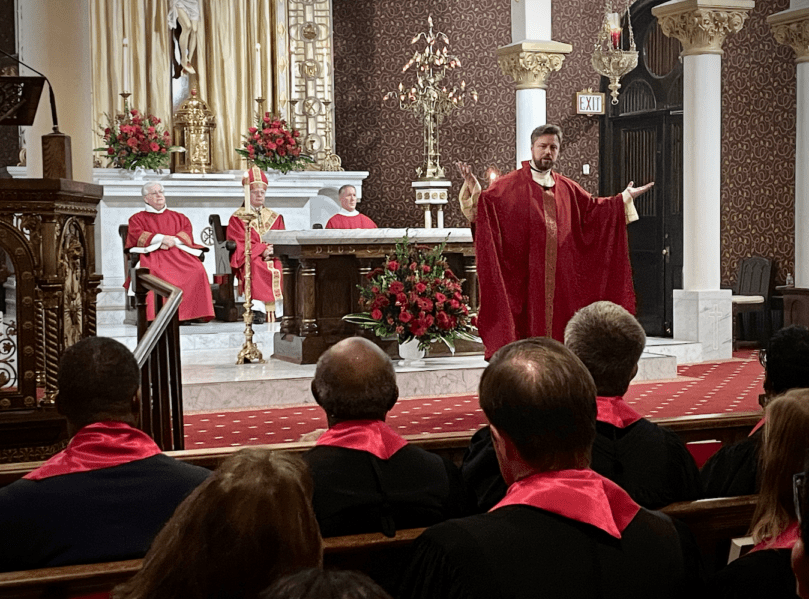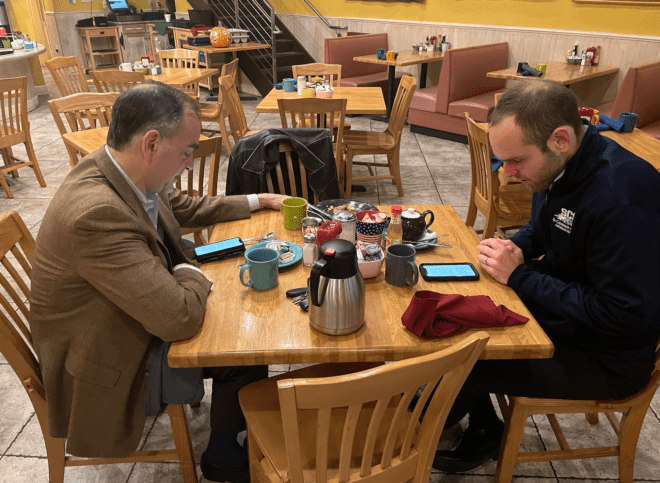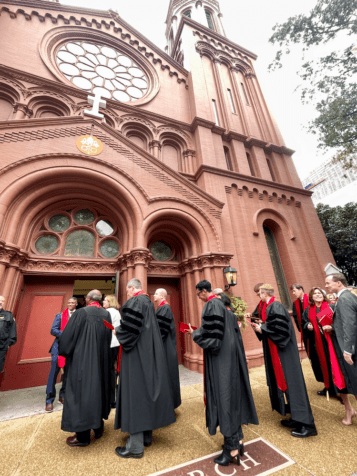 Photo by Andrew Nelson
Photo by Andrew NelsonAtlanta
St. Thomas More Society helps lawyers maintain spiritual values
By ANDREW NELSON, Staff Writer | Published November 2, 2023
ATLANTA—At a breakfast table crowded with hot sauce, dairy creamers and a thermos of coffee, members of the St. Thomas More Society prayed the liturgy of the hours.
Scrolling on their cell phones, the men recited the prayers of a recent Wednesday, the feast of St. Luke, the Gospel writer.
For Patrick Silloway, these monthly early morning gatherings are where Atlanta lawyers share not only a common profession, with its language and culture, but “we share the deepest part of ourselves,” the faith.
“What’s been great is to be in contact with others in the same profession, with the same spiritual grounding and spiritual goals,” he said.
Society past president Daniel Hart said he leaves the breakfasts with a fresh look at the overlap between faith and advocating for his white-collar clients.
“Every time I go, I end up leaving with an extra pop in my step. It fills my soul,” said Hart, an attorney at Seyfarth Shaw law firm.
The history of the St. Thomas More Society in Atlanta goes back some three decades. In the early 2000s, the organization refocused its efforts to host a Red Mass, inviting colleagues from law firms and courthouses throughout the Atlanta area to come together to pray and honor role models in the legal profession.

Patrick Silloway, right, and Alex Muñoz pray the liturgy of the hours during the monthly breakfast hosted by the St. Thomas More Society, a group of Catholic lawyers and others in the legal profession in the Atlanta area. Its mission is to provide opportunities to incorporate spirituality into the practice of law and strengthen the community. Photo by Andrew Nelson
In addition to the annual Mass, which is its most high-profile event, the group hosts smaller gatherings knitting the community together, with breakfasts at the Midtown eatery and continuing education classes sharing a Catholic perspective on the law and ethics.
There are an estimated 100 members of the society. The breakfast crowd once attracted such a crowd the group took over a nook of J. Christopher’s restaurant, but participation fell coming out of the coronavirus pandemic.
Intersection of Catholicism and the law
The practice of law is based on an adversarial system that pits two sides against each other in a court case. Lawyers pursue their claims with vigor, sometimes facing temptations to skirt ethical boundaries, demonize opponents and overlook unfavorable facts. For Catholic lawyers, the question is how to navigate this process while maintaining their spiritual values that promote the dignity of all and mercy amid a courtroom.
“There’s always a temptation to skew the facts in your client’s favor that’s beyond just good advocacy. There’s always a temptation to ignore that precedent that is against your client’s case,” Hart said.
Hart, 45, a labor and employment lawyer for almost 20 years, belongs to Holy Spirit Church, Atlanta. He served as the president of the St. Thomas More Society for three years during the pandemic. He believes reflecting on the faith and seeing the profession as a vocational calling can help lawyers uphold integrity and principles in their work.
“There’s always a temptation to look at the person on the other side of the dispute as an enemy rather than somebody who simply has different business interests and ultimately is themselves made in the likeness and image of God,” he said.
Silloway, 33, practices civil law and focuses on litigation at Balch & Bingham. His family worships at Holy Family Church, Marietta. A brother is a priest in the Atlanta Archdiocese.
He said a question faithful lawyers wrestle with is how to “How do I humanize my opponent?” He relishes the practice of law. But a challenge is to advocate diligently on behalf of his client against the opposing side while showing Christian love and charity.

The Oct. 12 annual Red Mass at the Basilica of the Sacred Heart of Jesus draws scores of judges. The gathering brings together the lawyers, court clerks and law enforcement officers who work in the administration of justice. The Mass is hosted by the St. Thomas More Society of Atlanta. Photo by Andrew Nelson
Silloway said society members often share their experiences to provide insights on professional and ethical challenges.
“Being able to toss around with other lawyers how you live out your faith in this profession is super helpful,” he said.
Both attorneys work at law firms that encourage them to offer services for free, aiding nonprofits that need legal expertise. Hart said those opportunities have been a great way to serve the community as a lawyer.
Administrators of justice drawn to Red Mass
The Oct. 12 annual Red Mass at the Basilica of the Sacred Heart of Jesus drew scores of judges draped in red sashes. The gathering brought together the lawyers, court clerks and law enforcement officers who work in the administration of justice. The prayers for the day invoke the Holy Spirit, represented by the color red, onto the work done by the women and men in the legal profession.
The Mass is a centuries-old tradition dating to medieval England to mark the opening of the calendar of the courts. The Mass is an established tradition in places like Washington, D.C., where some justices of the Supreme Court attend.
This year, Bishop Joel M. Konzen, SM, presided, and Father Benjamin Thomsen gave the homily. Also attending was Msgr. Edward Dillon, a canon lawyer.
Father Thomsen is a member of the legal community, serving as a county prosecutor before seminary. He remains a member of the Georgia Bar Association. During his remarks, Father Thomsen spoke about the scales of justice, the necessary balancing between justice and mercy.
“Mercy is deadly serious, as serious if not more so than justice itself,” he said.
Said Father Thomsen, “May God bless all of you in the judiciary this day. May all of you be true symbols, living symbols of justice and mercy. Because I think judiciary, more than any other branch of government, stands as a bulwark against the rule of politics over the rule of law, against the rule of anarchic brute force over the rule of ordered reason,” he said.
Later, at the lunch, the organization honored winners of its St. Francis of Assisi Award and St. Thomas More Awards.
Warrick Dunn, a former running back for the Atlanta Falcons and Tampa Bay Buccaneers and the Founder of Warrick Dunn Charities, was honored with the St. Francis of Assisi Award.
He was saluted for his nonprofit “Homes for the Holidays,” which aided more than 200 single parents and nearly 600 children in securing first-time homeownership across the country.
Recipients of this year’s St. Thomas More Awards were Judge W. Louis Sands, United States district judge for the Middle District of Georgia for his work on behalf of victims of domestic abuse and Therese “Tee” Barnes, clerk of the Supreme Court of Georgia, for her leadership, supporting the efforts of the Supreme Court and courts statewide to adjust to the COVID-19 challenges.